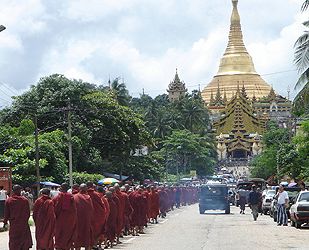UN envoy warns of Myanmar crisis
Security Council told of “serious concerns” as anti-government protests mount.

He said recent developments “underscore the urgency to step up our efforts to find solutions to the challenges facing the country”.
Gambari’s comments come amid growing tensions in Myanmar triggered by the government’s decision last month to impose a sudden massive hike in the price of fuel.
The price rise triggered a rare outpouring of public anger across Myanmar, the arrest of scores of pro-democracy activists and, more recently, the involvement of thousands of Buddhist monks.
| Myanmar protests |
Speaking after Gambari’s closed-door briefing to the Security Council, Zalmay Khalilzad, the US ambassador, said the escalating tensions in Myanmar “poses a threat to regional peace and stability”.
“We see a worsening of the political situation and that is affecting the well-being of the people of Burma and also having an impact on the region.”
He urged the military government of Myanmar, formerly known as Burma, to allow a visit by the UN envoy “as soon as possible”.
|
“We certainly are appalled by the steps the regime has taken to silence peaceful protest and to clamp down on dissent” John Sawyers, |
Britain‘s ambassador, John Sawyers, also backed an urgent visit by Gambari, saying the ruling generals’ crackdown on dissent was a further setback for a country that has already become a pariah to much of the international community.
“We certainly are appalled by the steps the regime has taken to silence peaceful protest and to clamp down on dissent,” he said.
He said Gambari would press for the immediate release of political prisoners, including Nobel Peace laureate Aung San Suu Kyi, who has been under house arrest for most of the past 17 years.
Sawyers said the UN envoy would also be seeking an end to fighting against ethnic minority Karens and urge the ruling generals to introduce “a genuinely transparent political process”.
On Thursday, before Gambari’s address, up to 5,000 Buddhist monks marched through Myanmar‘s biggest city, Yangon, on the third straight day of protests against the generals.
Monks are revered by Myanmar‘s majority Buddhist population and their involvement in the protests poses a serious challenge for the military government.
| Giving alms | ||
|
Giving donations to monks is an important spiritual duty for devout Buddhists. |
Alms are given by lay people to monks to nurture merit; the gesture also connects the worshipper to the spirituality the monk represents.
Without such rites a devout Buddhist is seen as losing all chance of attaining nirvana or release from the cycle of rebirth.
The monks have also said they will boycott alms from members of the military and their families – an act considered a major snub for devout Buddhists.
The monks have not chanted anti-government slogans during their marches, but carried an upside-down alms bowl, a widely-recognised symbol of protest in Myanmar.
Monks were also reported to have joined protests in several other towns and cities across the country.
The protests have become the most sustained challenge to Myanmar‘s military rulers since a wave of student demonstrations that were forcibly suppressed in December 1996.
Reports in Myanmar‘s state-run media have blamed the protests on “bogus monks” and foreign instigators looking to stir up trouble.

